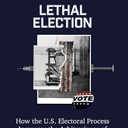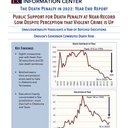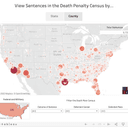New Report Shines Light on Military Veterans Facing the Death Penalty
Key Decision Makers in Justice System Often Ignore Critical Mitigating Evidence Related to Vets’ Service
(Washington, D.C.) More than one million veterans have returned from wars in Vietnam, Afghanistan, and the Middle East with symptoms of Post-Traumatic Stress Disorder (PTSD). Most veterans go on to live exemplary lives and are rightly honored for bravely serving their country. However, for a small but significant number, their mental wounds contributed to their committing acts of violence and they are now on death row. Many others with similar problems have already been executed.
A new report released on the eve of Veterans Day by the Death Penalty Information Center (DPIC) exposes the scope of this crisis and calls on authorities to better account for service members facing execution and identify where the system has fallen short. DPIC estimates that there are at least 300 veterans on death row, representing about 10 percent of the nation’s death row population.
As the country prepares to honor its military veterans on November 11, it may be a sobering and surprising revelation that many veterans have been adjudged as “the worst of the worst,” condemned to death, and executed by the government they once served. The first person executed this year was Andrew Brannan, a decorated combat veteran who fought in Vietnam, but returned with PTSD. He qualified for 100 percent disability from the Veterans Administration because of his mental disabilities. In a fleeting moment of out-of-character violence, he killed a police officer who had stopped him for speeding. At his trial, Brannan’s lawyer made little mention of the mental scars from his military service and the prosecution mocked his claim of PTSD. The Georgia Board of Pardons and Paroles denied him clemency. Other veterans have received their medals for dedicated service while on death row, but no real mercy.
“PTSD is not an excuse for all criminal acts, but it is a serious mental and emotional disorder that should be a strong mitigating factor against imposing the death penalty,” said Richard Dieter, DPIC’s Senior Program Director and the author of “Battle Scars: Military Veterans and the Death Penalty.” “Defense attorneys representing veterans accused of capital crimes often fail to investigate and present evidence of PTSD and other war-related mental injuries. Prosecutors, judges and juries are often not adequately informed about the psychological effects of being immersed in combat, even though the mental scars of war can be just as debilitating as physical injuries.”
“At a time in which the death penalty is being imposed less and less frequently, it is disturbing that so many veterans who were mentally and emotionally scarred while serving their country are now facing execution,” said Robert Dunham, Executive Director of DPIC. “It is our hope that a better understanding of the extreme and long-lasting effects of trauma and the resulting disabilities many veterans have experienced will lead to a larger conversation about imposing capital punishment on trauma survivors and other people with severe mental illnesses.”
The report is not offered as the final word on this important issue, but rather is intended as a wake-up call to government officials and the public that some veterans are being left behind.
###
The Death Penalty Information Center is a non-profit organization serving the media and the public with analysis and information on issues concerning capital punishment. The Center provides in-depth reports, issues press releases, conducts briefings for journalists, and serves as a resource to those working on this issue. The Center is funded through the generosity of individual donors and foundations, including the Roderick MacArthur Foundation, the Open Society Foundations, the Atlantic Philanthropies, and the Proteus Action League.



